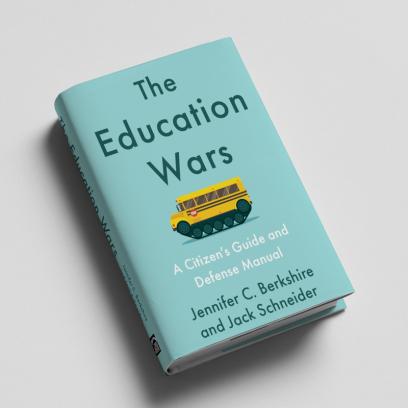In recent years, there’s been an alarming rise in book banning, curriculum censorship, and disinformation about what’s being taught in our public schools. What’s going on? In The Education Wars, journalist Jennifer C. Berkshire and professor Jack Schneider explore the extremist forces trying to divide families and educators. Here, we offer a brief excerpt of this insightful book.
–EDITORS
For as long as there have been public schools, there have been battles over what they should look like. As states enacted laws requiring young people to attend school in the 19th century, some parents revolted, declaring that they didn’t co-parent with the government. Twice during the 20th century, panics over Communist infiltration led to reckless campaigns against educators and battles over the curriculum. And nearly as soon as the second Red Scare abated, we began to fight over sex education, the expansion of LGBTQ rights in schools, and “secular humanism.” Again and again, we’ve faced off over what gets taught, what schools are for, and who gets to decide.
And yet, this time it really is different. In state after state, culture war is being used as a pretense to privatize schools.
Public education that is taxpayer supported, democratically controlled, and universally accessible is central to the American promise of equal opportunity. And as beleaguered as our schools may be—plagued by segregation, underfunding, and teacher shortages—we are a far more equal country than we would be without them. Today’s attacks on schools, teachers, and students, then, more than just represent another culture war. They are part of a broader effort to undermine the American commitment to educating every child, no matter their circumstances. They are part of an attack on democracy itself.
The concern that public schools and K–12 teachers are radicalizing youngsters has been persistent across the decades. But as young voters have broken decisively in favor of Democrats in recent elections, the rhetoric about indoctrination has reached a newly fevered pitch. The outsized role played by young voters in the 2022 mid-term elections, essentially blocking GOP gains, has resulted in calls to raise the voting age and has intensified scrutiny on schools and what they teach.
On a broad range of issues, young people are far more progressive than their elders and are rapidly becoming more politically engaged. Limiting what they learn in school is one way to try to shape the thinking of future generations in a more conservative direction. Strengthening the rights of certain parents over their children is another. New policies giving parents more say regarding what their kids can read, or what pronouns they can use at school, are also ways of tapping the brakes on generational change.
Our fights over parental rights also reflect another tension over the extent to which young people should have a voice and a say when it comes to policies that affect them. Young people are increasingly demanding more voice when it comes to such issues as gun violence, climate change, and the rights of LGBTQ youth. Today’s parental rights movement represents a backlash to that youth-driven movement.
This book is first and foremost about informing ordinary Americans—those who, whatever their political affiliation, care about public education. If public education is going to have a future in this country, they need to understand what’s happening in this challenging moment. But if this book is intended to be a guide to the “why” of the education wars, it’s also a manual for surviving them.
Nobody can or will “win” the educational culture wars, because as a populace, we are simply too diverse and divided for that. If we are to preserve our schools, it must be clear that public education is for all of us. We must win the peace.
Copyright © 2024 by Jennifer C. Berkshire and Jack Schneider. This excerpt originally appeared in The Education Wars: A Citizen’s Guide and Defense Manual, published by The New Press. Reprinted here with permission.

